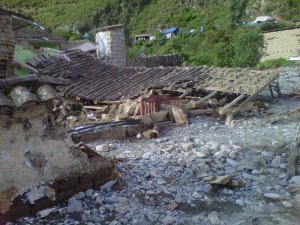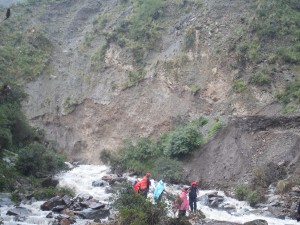The Peruvian Andes are home to some of the South America’s largest glaciers, sitting majestically on the high mountain peaks the Incas once worshiped and indigenous Andean peoples still pay homage to.
Unfortunately, climate change has taken a toll. Elder community members point to black rocky peaks and speak with nostalgia of when they were a brilliant white. Younger men and women simply shrug their shoulders and signal how quickly the ice of their beloved Apus has quietly receded. In recent years however, the disappearance of the Peruvian glaciers has not been so quiet.
The increasing pace of melting ice in the Peruvian Andes is believed to be impacting the rain cycles in the region, which can have potentially destructive consequences for the many communities which depend on agriculture for survival.
Two weeks ago, as is unfortunately becoming more and more common here in the region of Cusco, the Patacancha and Vilcanota rivers flooded nearby communities due to unusually heavy rainfall. Over one hundred families lost their houses and an untold amount of farmland was destroyed along with its yet-to-be harvested crops.
In the communities of Patacancha and Qhelqanqa, where the Alma Foundation has on-going projects, the impact of the flooding has gone without measurement and relatively unreported by the press and local authorities due to their distance and isolation from larger and lower altitude communities.
The road to Patacancha, which eventually leads to Qhelqanqa, was washed away in three separate locations during the flood, cutting off access to the communities expect for on foot. Fortunately, both communities suffered little damage to their houses- but unfortunately much of their very important potato crop was lost.
In Patacancha, a large mudslide was stopped from destroying part of the school and the trout farm thanks to a wall built last year by the Municipality of Ollantaytambo through the Alma project. There was some loss of baby trout due to flooding of the farm’s pools, but overall the project will be able to continue as planned.
In Qhelqanqa, the school did suffer some minor flooding, and the extent of the damage has yet to be investigated by municipal engineers. The Alma greenhouse was not affected by the flood.
The impact of the loss of the potato crop is yet to be seen. In both Patacancha and Qhelqanqa, potato is planted mainly for consumption purposes. Nevertheless, there is good news. Patacancha and Qhelqanqa both still practice traditional communal ownership of land. Therefore, though the communities lost all
of their farmland near the river and other areas due to flooding and mud slides, much of the potato crop planted in higher altitudes along the mountain sides can be salvaged. Thanks to traditional communal ownership, the surviving harvest will be divided amongst the entire community to ensure that no one will go hungry.


